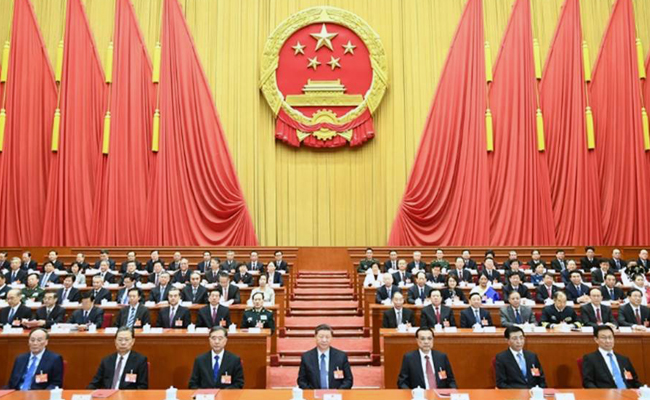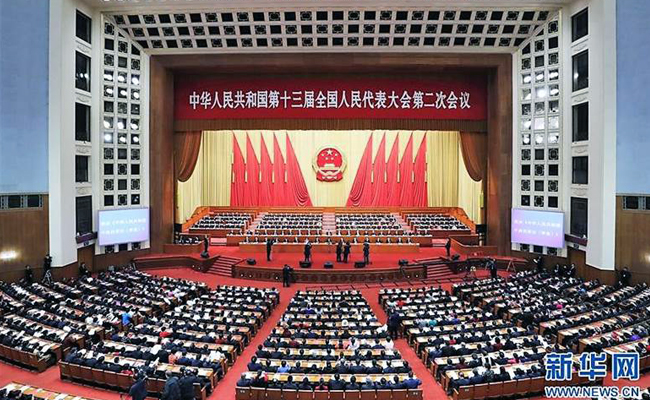China’s national legislature concludes annual session

Xi Jinping and other Chinese leaders attend the closing meeting of the second session of the 13th National People’s Congress (NPC) at the Great Hall of the People in Beijing, capital of China, March 15, 2019. (Xinhua/Xie Huanchi)
BEIJING, March 15 (Xinhua) — The second session of the 13th National People’s Congress (NPC) lowered the curtain Friday.
Xi Jinping and other Chinese leaders including Li Keqiang, Wang Yang, Wang Huning, Zhao Leji, Han Zheng and Wang Qishan attended the closing meeting at the Great Hall of the People in Beijing.
Legislators adopted China’s first unified foreign investment law, which is to take effect on Jan. 1, 2020.
Xi signed a presidential decree to promulgate the law.
“The newly-adopted legislation is a fundamental law in lifting China toward a new stage of high-level opening up in the new era,” said top legislator Li Zhanshu when addressing the meeting Friday.
He called for in-depth study and thorough implementation of the law to promote high-quality economic development.
Legislators also approved resolutions on the government work report, and the work reports of the NPC Standing Committee, the Supreme People’s Court and the Supreme People’s Procuratorate.
In addition, the legislators passed resolutions on the reports of the national economic and social development plans as well as the central and local budgets, and approved the resignation of NPC Standing Committee member Zhang Rongshun.
http://www.xinhuanet.com/
China adopts foreign investment law

China’s national legislature on Friday passed the foreign investment law, a landmark legislation that will provide stronger protection and a better business environment for overseas investors.
At around 9 a.m. Friday, an overwhelming majority of the deputies voted in favor of it at the closing meeting of the second session of the 13th National People’s Congress (NPC). The law will become effective on Jan. 1, 2020.
With unified provisions for the entry, promotion, protection, and management of foreign investment, it is a new and fundamental law for foreign investment in China.
It aims to improve the transparency of foreign investment policies and ensure that foreign-invested enterprises participate in market competition on an equal basis.
The state shall manage foreign investment according to the system of pre-establishment national treatment plus a negative list, the law stipulates.
Foreign-invested enterprises will equally enjoy government policies supporting enterprise development, and be able to participate in standard-setting on an equal footing and in government procurement through fair competition, according to the law.
The state shall protect the intellectual property rights of foreign investors and foreign-invested enterprises, it reads.
The law sends the signal of greater transparency, and will boost Chinese market’s appeal to foreign capital, said Vivian Jiang, vice chair of Deloitte China.
With the new law, China will be able to better protect foreign investors’ legitimate rights and interests, and create a law-based business environment that is internationalized and enabling.
After taking effect, the unified law will replace the three existing laws on Chinese-foreign equity joint ventures, wholly foreign-owned enterprises and Chinese-foreign contractual joint ventures.
The law on equity joint ventures was put into effect in 1979, soon after the country started to implement the reform and opening up policy. The latter two were enacted in the 1980s. Over the past decades, they have provided effective legal safeguards for foreign firms, but are no longer commensurate with the needs of reform and opening up in the new era.
By the end of 2018, about 960,000 foreign-invested enterprises had been set up in China, with the accumulated foreign direct investment exceeding 2.1 trillion U.S. dollars. Foreign direct investment into China has ranked first among developing countries for 27 consecutive years, according to the United Nations Conference on Trade and Development (UNCTAD).
The new law shows China’s will and determination to follow through with reform and opening up in a new historical context, said Wang Chen, vice chairman of the NPC Standing Committee. “It is a full testament to China’s determination and confidence in opening wider to the outside world and promoting foreign investment in the new era.”
“For foreign companies in China, I think everyone is waiting for the law to be passed, as it will create a level playing field,” said Harley Seyedin, president of the American Chamber of Commerce in South China.
According to a survey of 240 companies by the chamber, the respondents plan to increase their reinvestment budgets from profits in China this year to an estimated total of 19.4 billion U.S. dollars, up nearly 40 percent from 2018.
“The law will give more people confidence in China,” said Adam Dunnett, secretary general of the EU Chamber of Commerce in China.
http://www.ecns.cn/news/economy/2019-03-15/detail-ifzfmzhu2190398.shtml
Sources:
- People’s Daily: http://en.people.cn/102775/414813/index.html
- Xinhua News Agency: http://www.xinhuanet.com/english/special/2019lh/index.htm
- China News Service: http://www.ecns.cn/z/2019-02-13/detail-ifzeratr8867546.shtml
- China Radio International: http://chinaplus.cri.cn/special/npc-cppcc-2019/index.html





